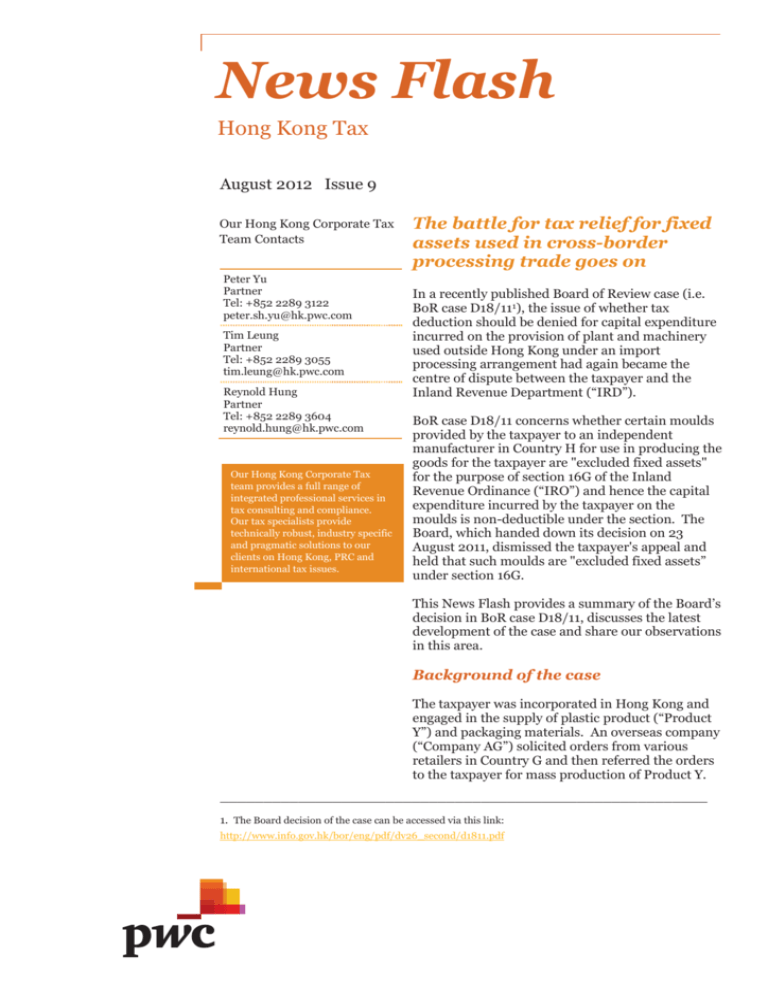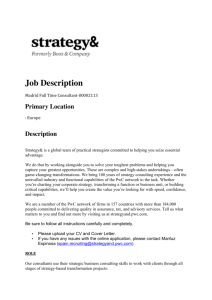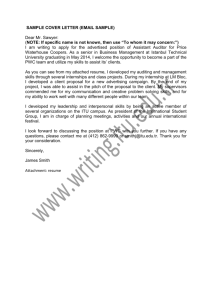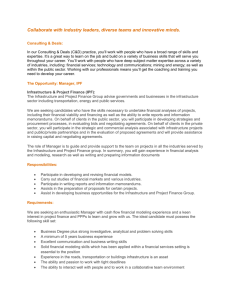
News Flash
Hong Kong Tax
August 2012 Issue 9
Our Hong Kong Corporate Tax
Team Contacts
Peter Yu
Partner
Tel: +852 2289 3122
peter.sh.yu@hk.pwc.com
Tim Leung
Partner
Tel: +852 2289 3055
tim.leung@hk.pwc.com
Reynold Hung
Partner
Tel: +852 2289 3604
reynold.hung@hk.pwc.com
Our Hong Kong Corporate Tax
team provides a full range of
integrated professional services in
tax consulting and compliance.
Our tax specialists provide
technically robust, industry specific
and pragmatic solutions to our
clients on Hong Kong, PRC and
international tax issues.
The battle for tax relief for fixed
assets used in cross-border
processing trade goes on
In a recently published Board of Review case (i.e.
BoR case D18/111), the issue of whether tax
deduction should be denied for capital expenditure
incurred on the provision of plant and machinery
used outside Hong Kong under an import
processing arrangement had again became the
centre of dispute between the taxpayer and the
Inland Revenue Department (“IRD”).
BoR case D18/11 concerns whether certain moulds
provided by the taxpayer to an independent
manufacturer in Country H for use in producing the
goods for the taxpayer are "excluded fixed assets"
for the purpose of section 16G of the Inland
Revenue Ordinance (“IRO”) and hence the capital
expenditure incurred by the taxpayer on the
moulds is non-deductible under the section. The
Board, which handed down its decision on 23
August 2011, dismissed the taxpayer's appeal and
held that such moulds are "excluded fixed assets”
under section 16G.
This News Flash provides a summary of the Board’s
decision in BoR case D18/11, discusses the latest
development of the case and share our observations
in this area.
Background of the case
The taxpayer was incorporated in Hong Kong and
engaged in the supply of plastic product (“Product
Y”) and packaging materials. An overseas company
(“Company AG”) solicited orders from various
retailers in Country G and then referred the orders
to the taxpayer for mass production of Product Y.
________________________________________________________
1. The Board decision of the case can be accessed via this link:
http://www.info.gov.hk/bor/eng/pdf/dv26_second/d1811.pdf
The taxpayer engaged an independent manufacturer (“Company C”) to design and produce the moulds
required for manufacturing Product Y and mass production of Product Y on behalf of the taxpayer. Product Y
was specifically designed for the retailers' needs and requirements. Company AG would register the design of
Product Y by way of patents in Country G. Company C was only allowed to use the moulds as instructed by
the taxpayer and for producing Product Y solely for the taxpayer. The moulds were owned by the taxpayer
and provided to Company C as part of the contractual arrangement with Company C. In most cases, the
moulds were physically retained by Company C in its factory.
The diagram below illustrates the background of the case.
The issue before the Board
Section 16G provides for deduction for capital expenditure incurred by taxpayers on prescribed fixed assets
(which include plant and machinery specifically and directly used for any manufacturing process) but such
deduction is not available for “excluded fixed assets”. An excluded fixed asset is defined in section 16G(6) as
“a fixed asset in which any person holds right as a lessee under a lease”. There is no specific definition of the
term “lease” in section 16G but the term is defined in section 2 of the IRO. Section 2 states that unless the
context otherwise requires, a lease, in relation to any machinery or plant, includes any arrangement under
which a right to use the machinery or plant is granted by the owner to another person.
The issue before the Board in this case is therefore whether the arrangement under which Company C was
allowed by the taxpayer to use the moulds in the production process constitutes a “lease” such that the moulds
are regarded as “excluded fixed assets” for the purpose of section 16G.
The taxpayer's submissions
The counsel for the taxpayer made the following submissions before the Board:
x
Section 16G should be regarded as a stand-alone sub-regime of the IRO that overrides section 17.
x
As there is no specific definition of “lease” within section 16G(6) that defines "excluded fixed assets", the
term “lease” should be given its ordinary legal meaning of a contractual entitlement to exclusive
possession for a defined period of time for the purposes of section 16G.
x
The extended inclusive definition of “lease” under section 2 of the IRO creates a statutory fiction that an
arrangement which is regarded as a lease under that section is actually not a lease in law.
News Flash – Hong Kong Tax
2
x
The opening words of section 2(1) “unless the context otherwise requires” dictate that there must be a
context for the primary or technical or ordinary usage of the term “lease” (e.g. section 16G) and a context
for the extended or fictional usage of the term (e.g. section 39E). It follows that the extended definition of
lease in section 2 works within the specific anti-avoidance regime of section 39E.
x
For the purposes of section 16G, the term “lease” should be interpreted so that it is consistent with the
intent of the legislation.
The Board’s decision
The Board dismissed the taxpayer's appeal on the following grounds and based on two previous Board
decisions on similar issue (i.e. BoR cases D61/08 and D19/09):
x
In interpreting a statute, the court's task is to ascertain the intention of the legislature as expressed in the
language of the statute. The court is not engaged in an exercise of ascertaining the legislative intent on its
own.
x
To adopt a purposive interpretation of a statute, the statutory language should be construed having regard
to its context and purpose. It is also necessary to read all the relevant provisions together and in the
context of the whole statute as a purposive unity in its appropriate legal and social setting.
x
In the Board's view, there is no basis for the Board to ignore the statutory definition of “lease” in section 2
and instead apply an ordinary meaning to the word.
x
The wording used in section 2(1) is unequivocal and clear and the word "include" in that section is used to
enlarge or expand on the ordinary meaning of the word "lease".
x
It follows that the arrangement under which a right to use the moulds was granted by the taxpayer to
Company C falls unequivocally within the definition of a "lease" as provided in section 2 and therefore the
moulds are "excluded fixed assets" and do not qualify for deduction under section 16G.
x
Although the above interpretation may mean it is very difficult under any circumstances for any taxpayer
to take advantage of the deduction available under section 16G, applying the extended definition of "lease"
in section 2 is the correct interpretation of section 16G.
The latest development of the case
Subsequent to the Board’s decision, the taxpayer applied to the Board to state a case for appeal to the Court of
First Instance (“CFI”). The taxpayer’s application was allowed by the Board (see BoR case D39/112) on 9
December 2011. The date of hearing of the case by the CFI has yet to be fixed.
PwC observations
The key issue in this case is whether, in the context of section 16G, the term "lease" should be interpreted in
accordance with the definition in section 2 or be given its ordinary meaning. This is a question of law to be
decided by the CFI. The issue is specifically on the interpretation of the term “lease” in section 16G. Even if
the final outcome of the present case sides with the taxpayer, the decision will not affect the application of the
statutory definition of "lease" in the context of section 39E. The context and legislative intent of sections 16G
and 39E are different. The purpose of section 16G is to provide for immediate deduction for capital
expenditure incurred on prescribed fixed assets that would otherwise not be available whereas section 39E is a
specific anti-avoidance provision. There are also precedent cases on section 39E supporting the IRD’s view
on the section 39E issue (i.e. BoR cases D61/08 and D19/09).
Given the above, it is unlikely for the IRD to change its stance on the section 39E issue and the Board will
likely be bound by the previous decisions in cases D61/08 and D19/09 to rule in favour of the IRD on the issue
irrespective of the final outcome of the present case. Accordingly, taxpayers wishing to further pursue the
section 39E issue will have to take their cases to a court separately.
2
The Board decision of the case can be accessed via this link: http://www.info.gov.hk/bor/eng/pdf/dv26_third/d3911.pdf
News Flash – Hong Kong Tax
3
In the context of this News Flash, China, Mainland China or the PRC refers to the People’s Republic of China but excludes Hong Kong Special Administrative Region,
Macao Special Administrative Region and Taiwan Region.
The information contained in this publication is for general guidance on matters of interest only and is not meant to be comprehensive. The application and impact of
laws can vary widely based on the specific facts involved. Before taking any action, please ensure that you obtain advice specific to your circumstances from your
usual PricewaterhouseCoopers client service team or your other tax advisers. The materials contained in this publication were assembled on 24 August 2012 and
were based on the law enforceable and information available at that time.
To make enquiries about our Hong Kong tax and business advisory services, please feel free to contact the following lead specialist partners:
Entertainment & Media
Colin Farrell
Tel: +852 2289 3800
colin.farrell@hk.pwc.com
Industrial Products
Medinah Ip
Tel: +852 2289 3022
medinah.ip@hk.pwc.com
Info-Comms
Suzanne Wat
Tel: +852 2289 3002
suzanne.wat@hk.pwc.com
Financial Services
Florence Yip
Tel: +852 2289 1833
florence.kf.yip@hk.pwc.com
Logistics & Transportation
Reynold Hung
Tel: +852 2289 3604
reynold.hung@hk.pwc.com
Real Estate
KK So
Tel: +852 2289 3789
kk.so@hk.pwc.com
Retail & Consumer Products
Tim Leung
Tel: +852 2289 3055
tim.leung@hk.pwc.com
Investigation Services
Kaiser Kwan
Tel: +852 2289 3868
kaiser.kwan@hk.pwc.com
International Assignment Services
Mandy Kwok
Tel: +852 2289 3900
mandy.kwok@hk.pwc.com
Personal Financial Services
John Wong
Tel: +852 2289 1810
john.cw.wong@hk.pwc.com
Merger & Acquisition
Nick Dignan
Tel: +852 2289 3702
nick.dignan@hk.pwc.com
Transfer Pricing
Cecilia Lee
Tel: +852 2289 5690
cecilia.sk.lee@hk.pwc.com
Company Fiduciary & Administration Services
John Wong
Tel: +852 2289 1810
john.cw.wong@hk.pwc.com
Customs & International Trade
Colbert Lam
Tel: +852 2289 3323
colbert.ky.lam@hk.pwc.com
International Tax Advisory
Nick Dignan
Tel: +852 2289 3702
nick.dignan@hk.pwc.com
Tax Accounting Services
Suzanne Wat
Tel: +852 2289 3002
suzanne.wat@hk.pwc.com
Value Chain Transformation
Tim Leung
Tel: +852 2289 3055
tim.leung@hk.pwc.com
Beijing
Edward Shum
Tel: +86 (10) 6533 2866
edward.shum@cn.pwc.com
Chongqing
Robert Li
Tel: +86 (23) 6393 7888
robert.li@cn.pwc.com
Dalian
Rex Chan
Tel: +86 (411) 8379 1888
rex.c.chan@cn.pwc.com
Guangzhou
Daisy Kwun
Tel: +86 (20) 3819 2338
daisy.kwun@cn.pwc.com
Hangzhou
Jenny Chong
Tel: +86 (21) 2323 3219
j.chong@cn.pwc.com
Hong Kong
Peter Yu
Tel: +852 2289 3122
peter.sh.yu@hk.pwc.com
Macao
Pat Wong
Tel: +853 8799 5122
pat.lk.wong@hk.pwc.com
Nanjing
Jane Wang
Tel: +86 (25) 6608 6288
jane.y.wang@cn.pwc.com
Ningbo
Ray Zhu
Tel: +86 (21) 2323 3071
ray.zhu@cn.pwc.com
Qingdao
Steven Wong
Tel: +86 (532) 8089 1888
steven.wong@cn.pwc.com
Shanghai
Peter Ng
Tel: +86 (21) 2323 1828
peter.ng@cn.pwc.com
Shenzhen
Charles Lee
Tel: +86 (755) 8261 8899
charles.lee@cn.pwc.com
Singapore
Lennon Lee
Tel: +65 6236 3728
lennon.kl.lee@sg.pwc.com
Suzhou
Linjun Shen
Tel: +86 (512) 6273 1888
linjun.shen@cn.pwc.com
Taiwan
Steven Go
Tel: +886 (2) 2729 6666
steven.go@tw.pwc.com
Tianjin
Kelvin Lee
Tel: +86 (22) 2318 3068
kelvin.lee@cn.pwc.com
Xiamen
Mike Chiang
Tel: +86 (592) 210 7888
mike.chiang@cn.pwc.com
Xian
Elton Huang
Tel: +86 (29) 8469 2688
elton.huang@cn.pwc.com
Our regional contacts:
This Hong Kong Tax News Flash is issued by the National Tax Policy Services in Hong Kong and China, which comprises of a team of experienced professionals
dedicated to monitoring, studying and analysing the existing and evolving policies in taxation and other business regulations in China, Hong Kong, Singapore and
Taiwan. They support the PricewaterhouseCoopers partners and staff in their provision of quality professional services to businesses and maintain thoughtleadership by sharing knowledge with the relevant tax and other regulatory authorities, academies, business communities, professionals and other interested parties.
For more information, please contact:
Matthew Mui
Tel: +86 (10) 6533 3028
matthew.mui@cn.pwc.com
Please visit PricewaterhouseCoopers websites at http://www.pwccn.com (China Home) or http://www.pwchk.com (Hong Kong Home) for practical insights and
professional solutions to current and emerging business issues.
© 2012 PricewaterhouseCoopers Ltd. All rights reserved. In this document, ĀPwC” refers to PricewaterhouseCoopers Ltd. which is a member
firm of PricewaterhouseCoopers International Limited, each member firm of which is a separate legal entity.




